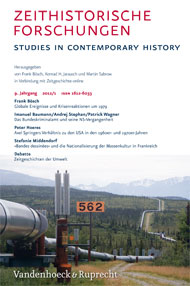 The New Issue of “Zeithistorische Forschungen” of September 2011 is now available online and includes the following articles:
The New Issue of “Zeithistorische Forschungen” of September 2011 is now available online and includes the following articles:
Verena Steller Zwischen
Geheimnis und Öffentlichkeit Die Pariser Friedensverhandlungen 1919und die Krise der universalen Diplomatie
The ‘old’ diplomacy of the nineteenth century relied on face-to-face-interaction as a universally acknowledged language of diplomacy. This globally accepted character of diplomacy was challenged by the universal experience of crisis, violence, and destruction brought about by the First World War: The public held the ‘old’ European secret diplomacy responsible for the war. Once public trust had been lost, diplomacy fell into a crisis of legitimacy and representation. The public sphere and the media demanded that decision-making processes in diplomacy be visible and transparent – a claim summarised in President Wilson’s emblematic New Diplomacy. Against the backdrop of current debates about a ‘new’ history of diplomacy, this article analyses the Paris Peace Conference of 1919 and especially the two official occasions of direct interaction between the Allied and German delegations at Versailles, where the Paris Peace Treaty was presented and signed. The article looks at the way in which the common language of diplomacy was lost during the course of these negotiations, which long-term factors were responsible for its disappearance, and how the war acted as a catalyst for these fundamental changes.
Kerstin von Lingen „Crimes Against Humanity“
Eine umstrittene Universalie im Völkerrecht
des 20. Jahrhunderts
In 1945 in Nuremberg, the Allies advocated the new principle that human rights take precedence over national law, according to the idea that states should be held accountable for their deeds by means of justice. In this case, Nazi Germany was to be held responsible for crimes committed during the Second World War. Since the mid-1990s, further trials based on this rule have taken place in Rwanda, Yugoslavia and Cambodia. The trial of state elites for war crimes and ‘crimes against humanity’ in court has been very controversial and is still not accepted in many parts of the world today. This article presents the three main stages leading to transitional justice: first, the failed trials in Leipzig after the First World War; second, the International Military Tribunals in Nuremberg and Tokyo; third, the debate about the ratification of the International Criminal Court in Den Haag and the strong opposition to it in the USA, which has continued since 2002. Criticism focuses on the degree to which states are prepared to hand over parts of their national sovereignty, especially in justice, to supranational organisations.
Lasse Heerten A wie Auschwitz, B wie Biafra
Der Bürgerkrieg in Nigeria (1967–1970) und die Universalisierung des Holocaust
In the summer of 1968, the publication of images of starving ‘Biafran children’ turned the Nigerian Civil War into an international media event. The power of this ‘image act’ was partially fuelled by the fact that many contemporaries associated these images with photographs taken during the liberation of the concentration camps in 1945. This article outlines the international political communication about Biafra and analyses references to the emerging cultural memory of the Holocaust on the basis of media reports, activists’ publications and archival sources. The inscription of Biafra into the iconography of the Holocaust led to the establishment of a new rhetoric of Holocaust comparisons which made both events, the Nigerian Civil War and Nazi crimes, visible as genocide. This rhetoric effectively drew attention to the conflict, but fell short of apprehending its complex reality. When it became clear that Biafra was no ‘new Holocaust’, the power of the images and their accompanying rhetoric waned.
Andrea Rehling Universalismen und Partikularismen im Widerstreit:
Zur Genese des UNESCO-Welterbes
The origins and development of the World Heritage Convention are closely related to the conflicts which accompanied the revision of the postwar international order in the 1960s and 1970s. This article examines political debates about what constituted the ‘heritage of mankind’ in order to explain the shifting notions of particularism and universalism. Exemplary conflicts show that understandings of the categories ‘culture’ and ‘nature’ changed between 1950 and 1980, as a result of which two different rationalities underpinned the World Heritage Programme. In addition, the article analyses the expectations expressed in anticipation of the worldwide influence which this governance institution was to acquire. These shifting categories and public expectations may explain why the regional allocation of World Heritage Sites and the relation between cultural and natural heritage on the World Heritage List are uneven and inconsistent. The article makes a contribution towards the historical semantics of the concepts of ‘culture’, ‘nature’ and ‘heritage’ in the twentieth century.
